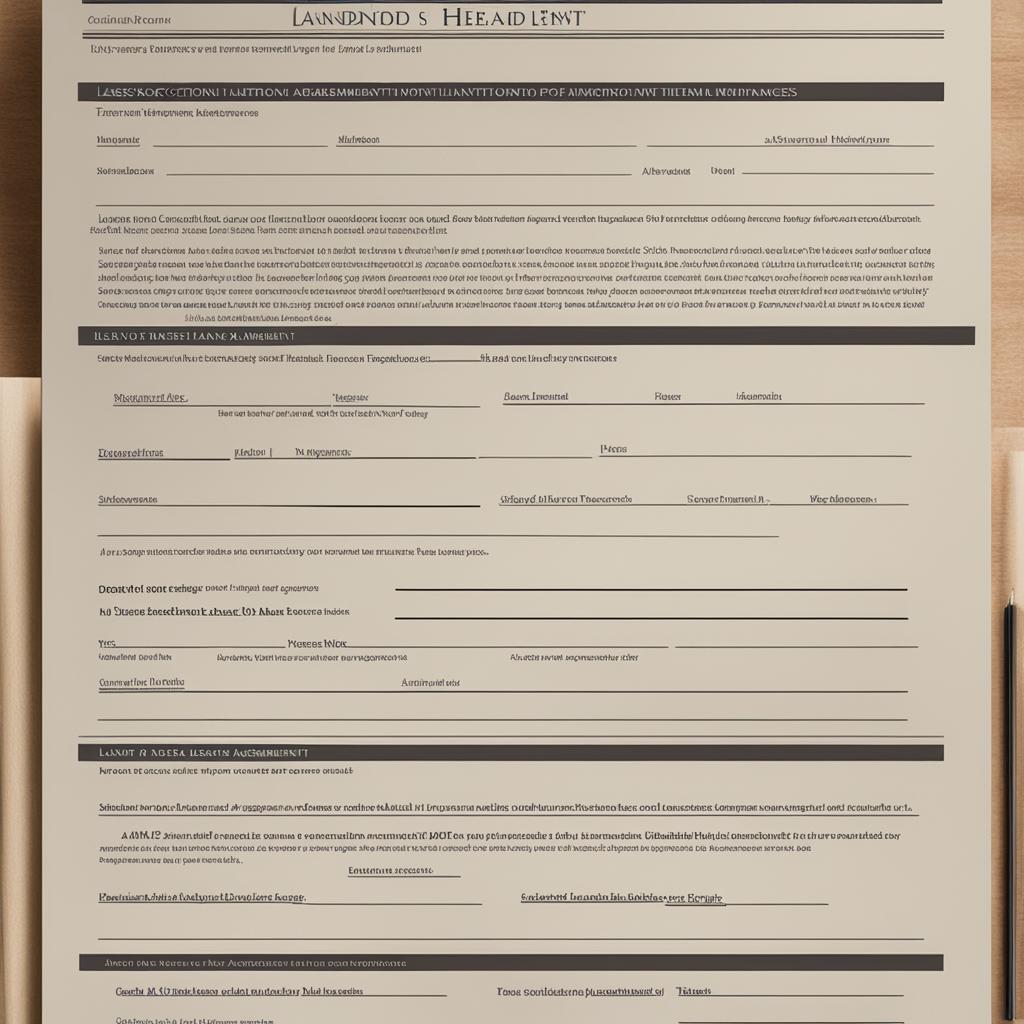Renting your house with an agent can be a smart move for homeowners or real estate investors looking to find the right tenant and streamline the rental process. By working with a realtor, you can benefit from their expertise, network, and industry knowledge to attract reliable tenants and maximize your rental income. In this step-by-step guide, I will explore the essential steps and considerations involved in renting your house with an agent.
Key Takeaways:
- Working with a real estate agent can help you find the right tenant and streamline the rental process.
- A home valuation report can help you determine the estimated rental value of your property.
- Check for any restrictions or regulations that prohibit or require approval for rentals.
- Research and interview potential real estate agents to find a reputable and experienced professional.
- Thoroughly review and consult with an attorney on the rental contract terms and conditions.
Run a Home Valuation Report
Before moving forward with the rental process, it’s important to run a home valuation report to determine the estimated rental value of your property. This report takes into account factors such as square footage, property value, and similar rental properties in the area. By knowing the competitive rental prices in your market, you can set an appropriate rent price that attracts tenants while ensuring you maximize your rental income.
Running a home valuation report involves analyzing local rental market data and performing a thorough rental value estimation. This process helps you understand the current rental rates in your area and assess the potential earning capacity of your property.
During a rental market analysis, you’ll consider various factors that influence rental prices, such as location, property size, amenities, and market demand. This analysis allows you to compare your property’s features and condition with similar rental properties, giving you valuable insights into setting competitive rent prices.
To conduct a home valuation report, you can use several resources and tools. Real estate websites and online platforms often provide rental value estimations based on historical data and current market trends. Additionally, you can consult with local real estate agents who have in-depth knowledge of the rental market in your area.
By obtaining an accurate home valuation report, you can confidently set a rent price that attracts quality tenants while ensuring you maximize your rental income. This data-driven approach helps you position your property competitively in the rental market, increasing your chances of finding reliable tenants quickly.
Make Sure You’re Allowed to Rent Your Property
Before renting your property, it’s crucial to check if there are any restrictions or regulations that prohibit or require approval for rentals. This is particularly important for properties in structures like condos, apartment complexes, gated communities, or those with homeowners associations (HOAs). Failure to comply with these rules can result in fines or penalties.
Make sure to review your paperwork and consult with the appropriate authorities to ensure you’re allowed to rent your property.
Understanding Landlord Regulations and Rental Restrictions
As a landlord, it’s important to familiarize yourself with the regulations and restrictions that govern rental properties in your area. These regulations can vary from state to state and even within local municipalities. It’s your responsibility to comply with these rules to avoid legal issues and ensure a smooth rental experience.
If your property is located in a condo, apartment complex, or gated community, there may be additional rules and restrictions imposed by the homeowners association (HOA) or property management. These rules can include specific rental guidelines, such as the number of allowed tenants, lease terms, or even a rental approval process.
Here are a few key areas to consider when checking for landlord regulations and rental restrictions:
- Local rental ordinances: Research the specific rental laws and regulations in your city or town. These ordinances may cover areas such as tenant rights, security deposits, eviction procedures, and fair housing laws.
- HOA rules and bylaws: If your property is part of an HOA, carefully review the association’s rules and bylaws to ensure you comply with their rental policies and any restrictions they may have in place.
- Condo rental permissions: For condominiums, check the condo association’s rules and regulations regarding rental permissions. Some condos may have restrictions on the number of units that can be rented, rental durations, or even require approval before renting.
Awareness of landlord regulations, rental restrictions, HOA rules, and condo rental permissions is crucial to avoid legal complications and ensure a smooth rental process.
Find a Quality Real Estate Agent
Now that you have run a home valuation report and made sure you’re allowed to rent your property, it’s time to find a reputable and experienced real estate agent who specializes in rental properties. Hiring a real estate agent brings a wealth of knowledge and expertise to the table, helping you navigate the rental process with ease.
When searching for a real estate agent, take the time to thoroughly research and interview potential candidates. Look for agents who have a deep understanding of the local market and a proven track record of success in rental property management. Consider their experience, fees, and the services they offer to ensure they align with your needs.
Reading online reviews and seeking recommendations from friends or colleagues can also provide valuable insights into an agent’s reliability and professionalism. Additionally, chemistry and communication are crucial factors in selecting an agent, as you’ll be working closely together throughout the rental journey.
What to Consider when Choosing a Real Estate Agent
- Experience: Look for an agent with ample experience in rental property management.
- Specialization: Ensure the agent specializes in rental properties, as their expertise will be invaluable.
- Market Knowledge: A local market expert will understand rental trends and pricing, helping you set competitive rent prices.
- Professional Network: A well-connected agent will have a broad network of potential tenants and other industry professionals.
- Services Offered: Consider the specific services the agent offers, such as marketing, tenant screening, and lease agreements.
- Online Reviews: Read reviews from previous clients to gauge the agent’s reputation and service quality.
- Chemistry: Trust and communication are essential for a successful partnership, so consider your personal rapport with the agent.
By taking the time to carefully select a quality real estate agent, you’ll benefit from their expertise, industry knowledge, and network, setting yourself up for a successful rental experience.
| Benefits of Finding a Quality Real Estate Agent |
|---|
| Access to a wide pool of potential tenants |
| Expert guidance in setting competitive rent prices |
| Effective marketing strategies to attract reliable tenants |
| Thorough tenant screening for peace of mind |
| Efficient handling of lease agreements and paperwork |
| Professional negotiations to ensure fair rental terms |
| Ongoing support and communication throughout the rental process |
Scour the Contract
Before signing a contract with an agent, it is crucial to carefully review the terms and conditions. This step ensures that you understand your obligations and rights as a landlord and that the contract aligns with local rental laws. To further protect your interests, it is advisable to consult with an attorney for a legal review of the rental contract.
During the contract review process, pay close attention to the agent’s responsibilities, which should be clearly outlined in the document. These responsibilities may include marketing your property, screening potential tenants, handling lease agreements, collecting rent, and ensuring compliance with local regulations. By thoroughly understanding these details, you can hold the agent accountable and ensure a smooth rental process.
Remember, a rental contract is a legally binding agreement. It is essential to have a clear understanding of its contents and implications before signing.
An attorney consultation provides an added layer of protection and can help you identify any potential red flags or legal implications in the contract. They can offer valuable advice on how to negotiate any terms that may need adjustment to better protect your interests.
By investing time and effort in reviewing the contract and seeking legal guidance, you can enter into a rental agreement confidently, knowing that your interests as a landlord are well-protected.

| **Responsibility** | **Description** |
| — | — |
| Marketing the Property | The agent is responsible for creating effective marketing strategies to attract potential tenants to your rental property. This may include online listings, professional photography, virtual tours, and advertising campaigns. |
| Tenant Screening | The agent will handle the tenant screening process to ensure that prospective tenants meet the necessary qualifications. This may involve conducting background checks, verifying income and employment, and checking references. |
| Handling Lease Agreements | The agent is responsible for preparing and coordinating the signing of lease agreements between you and the tenant. They will ensure that all necessary terms and conditions are included and legally compliant. |
| Collecting Rent | The agent will collect rent from tenants on your behalf and ensure timely payments. They may also take care of any late payment issues, including initiating eviction procedures if necessary. |
| Compliance with Local Regulations | The agent will stay up-to-date with local rental laws and regulations to ensure that your property remains in compliance. They will handle any necessary permits or inspections required by local authorities. |
By carefully reviewing the contract and understanding the agent’s responsibilities, you can establish a clear working relationship and set expectations from the beginning. This will help prevent misunderstandings or disputes down the line and contribute to a successful landlord-agent partnership.
Consider Upgrading Your Rental Property
After hiring an agent, it’s a good idea to evaluate your rental property and consider making upgrades and improvements. Upgrading your property can help attract higher-quality tenants and potentially increase rental income. Working closely with your agent, you can identify areas that could benefit from improvements, such as capital enhancements or cosmetic changes.
Capital enhancements refer to significant upgrades or renovations that can increase the value and appeal of your property. These could include:
- Updating fixtures and appliances
- Renovating kitchens or bathrooms
- Expanding living spaces
- Installing energy-efficient features
- Improving security systems
Cosmetic changes focus on enhancing the visual appeal of your rental property. These upgrades may include:
- Refreshing the paint or wallpaper
- Replacing flooring or carpets
- Landscaping and improving curb appeal
- Adding modern lighting fixtures
- Upgrading window treatments
By collaborating with your agent and investing in these upgrades, you can attract tenants who are willing to pay higher rent prices for a well-maintained and updated property.
Maximizing Rental Value
Investing in property upgrades can also help you maximize the rental value of your property. By making strategic improvements and offering desirable amenities, you can justify higher rent prices. Keep in mind that the cost of upgrades should align with the potential increase in rent prices to ensure a favorable return on investment.
Increasing Rent Prices
Upgrading your rental property can provide an opportunity to increase rent prices. By offering modern and high-quality features, you can attract tenants who are willing to pay more for an upgraded living experience. Conducting market research and comparing similar rental properties in your area can help you determine the appropriate rent increase.
“Investing in property upgrades not only enhances the tenant experience but can also increase rental income.”
– [Agent Name], Real Estate Agent
Potential Upgrades and Their Impact on Rent Prices
| Upgrade | Potential Impact on Rent Prices |
|---|---|
| Upgraded kitchen appliances and fixtures | Potential for a 5-10% increase |
| Renovated bathrooms | Potential for a 7-12% increase |
| Improved energy efficiency | Potential for a 3-8% increase |
| Enhanced curb appeal | Potential for a 2-5% increase |
| Modernized lighting fixtures | Potential for a 2-4% increase |
Leave Renting To the Real Estate Agent
Once you’ve enlisted the help of a real estate agent, it’s best to entrust the rental process to their expertise. Allow the agent to handle crucial tasks such as marketing the property, listing it on popular rental platforms, screening potential tenants, conducting property showings, and negotiating lease arrangements. By letting the agent take the reins, you can save time and avoid potential missteps that could negatively impact your rental experience.
| Tasks | Benefits |
|---|---|
| Marketing the Property |
|
| Listing on Rental Platforms |
|
| Screening Potential Tenants |
|
| Conducting Property Showings |
|
| Negotiating Lease Arrangements |
|
By collaborating with a real estate agent, you can ensure that the rental process is managed efficiently and professionally, ultimately optimizing your rental property’s performance.

Hire a Property Management Company
When it comes to managing your rental property, hiring a property management company can provide you with peace of mind and save you valuable time. A property management company specializes in handling the day-to-day operations of rental properties, ensuring everything runs smoothly and efficiently. From property maintenance to tenant communication and even eviction assistance, these professionals have the knowledge and experience to tackle any challenge that may arise.
By hiring a property management company, you can delegate the responsibilities of ongoing property maintenance. They will take care of tasks such as repairs, maintenance checks, and regular inspections, ensuring that your rental property is always in excellent condition. This saves you from the hassle of dealing with maintenance requests and emergencies, as the property management company will handle them promptly and professionally.
Tenant communication is another area where a property management company can be incredibly beneficial. They serve as the main point of contact for your tenants, handling inquiries, complaints, and any other communication needs. This ensures effective and efficient communication between you and your tenants, allowing you to maintain good relationships while avoiding any misunderstandings or delays.
In the unfortunate event that eviction becomes necessary, a property management company can provide valuable assistance. They have experience with the legal processes involved in evictions and can guide you through the necessary steps. This includes handling paperwork, coordinating with attorneys if needed, and ensuring that the eviction process adheres to local laws and regulations.
“Hiring a property management company can be a game-changer for landlords who want to free up their time and eliminate the stress associated with managing their rental property.” – John Smith, experienced landlord
Benefits of Hiring a Property Management Company:
- Time-saving: With a property management company handling various tasks, you can focus on other important aspects of your life or invest your time in growing your real estate portfolio.
- Expertise and industry knowledge: Property management companies have extensive knowledge of the rental market, local regulations, and best practices. They can offer valuable insights to maximize your rental income and minimize risks.
- Access to a network of professionals: Property management companies often have a network of trusted contractors, vendors, and service providers. This allows for efficient and cost-effective property maintenance and repairs.
- Legal compliance: Property management companies stay up-to-date with the latest rental laws and regulations, ensuring that your property and rental agreements are in compliance.
By hiring a property management company, you can create a more hands-off rental property experience while ensuring that your investment continues to thrive. Their expertise, industry connections, and commitment to excellence can make a significant difference in maximizing your rental income and maintaining a successful rental property.
Benefits of Working with a Rental Agent
Working with a rental agent can provide landlords with numerous benefits that contribute to a successful and profitable rental experience. Let’s explore the advantages of partnering with a rental agent:
1. Steady Cash Flow
A primary benefit of working with a rental agent is the assurance of a steady cash flow from rental income. With their expertise, agents can help you set optimal rental rates that attract reliable tenants while maximizing your returns. By ensuring a consistent source of revenue, rental agents help landlords maintain financial stability and meet their investment goals.
2. Time Savings
Delegating the rental process to a professional agent saves landlords valuable time and effort. Rental agents handle various time-consuming tasks, including tenant screening, lease agreements, and property showings. By entrusting these responsibilities to an agent, landlords can focus on other important aspects of their lives or dedicate time to growing their real estate portfolio.
3. Maximizing Returns
A knowledgeable rental agent can provide valuable insights on optimizing your rental property’s income potential. They can suggest appropriate rent rates based on market trends and property condition. Rental agents may also recommend property improvements that attract higher-quality tenants and allow landlords to charge premium rent prices.
Working with a rental agent can help landlords generate a steady cash flow, save time, and maximize returns on their rental properties.
In summary, renting your property with the assistance of a rental agent offers benefits such as steady cash flow, time savings, and the opportunity to maximize returns. By leveraging their expertise, landlords can enhance their rental income and enjoy a more streamlined and profitable rental experience.

Frequently Asked Questions
Here are some common questions landlords may have when considering renting their house with an agent:
-
Can I rent my house without using an agent?
Yes, it is possible to rent your house without using an agent. However, working with an agent brings numerous benefits, including their expertise in the rental market, access to a wider pool of potential tenants, and professional assistance with marketing and property management. An agent can help streamline the rental process and maximize your rental income.
-
How do I find a reliable real estate agent?
To find a reliable real estate agent, start by conducting thorough research and interviewing potential agents. Look for agents with experience in rental properties, a deep knowledge of the local market, and positive reviews from previous clients. It’s also important to establish good personal chemistry with the agent, as you will be working closely together throughout the rental process.
-
What are the agent’s responsibilities in renting my house?
The agent’s responsibilities typically include marketing the property, screening potential tenants, coordinating property showings, handling lease agreements, collecting rent, and addressing tenant inquiries and concerns. The specific responsibilities may vary based on the agreement between you and the agent, so it’s important to thoroughly review the contract and discuss expectations with the agent.
-
How much does it cost to work with a real estate agent?
The cost of working with a real estate agent varies and is typically based on a percentage of the rental income. The exact percentage or fee structure should be discussed and agreed upon with the agent before signing a contract. Keep in mind that while working with an agent incurs a cost, their expertise can often help you maximize your rental income, making it a worthwhile investment.
-
What happens if the rental property remains vacant?
If the rental property remains vacant for an extended period, it’s important to evaluate the situation and work with your agent to identify any potential issues. Factors such as market demand, rental price competitiveness, or property condition may contribute to longer vacancies. Your agent can provide insights and suggest adjustments, such as reevaluating the rental price, making property improvements, or refining marketing strategies, to attract more potential tenants.
Can I Move into My Rental Property?
As a landlord, you have the freedom to make decisions regarding your property. However, it’s crucial to understand the distinction between a rental property and a home. Renting out your property allows you to generate rental income, while living in it means forgoing that income in exchange for having a place to call home.
When deciding whether or not to move into your rental property, it’s essential to consider your financial goals and priorities. Here are a few points to think about:
- Rental Property vs. Home: Consider if living in the property aligns with your long-term plans. Are you looking for a permanent residence or a temporary arrangement?
- Rental Income vs. Dwelling: Assess the financial impact of living in your rental property. How does the rental income compare to potential living expenses?
- Personal Use Restrictions: Review any agreements or legal restrictions that may limit or prohibit you from occupying the property while renting it out.
- Market Demand: Evaluate the local rental market to determine if the potential rental income justifies forgoing it to live in the property.
Ultimately, the decision to move into your rental property depends on your unique circumstances and goals. Consider consulting with a real estate professional or financial advisor who can provide personalized advice based on your specific situation.
Image: A home with a “For Rent” sign, symbolizing the decision between renting out the property or living in it.
What Is a Lease Agreement?
A lease agreement is a legally binding document that outlines the terms and conditions of renting a property. It serves as a contract between the landlord and the tenant, defining rights and responsibilities for both parties.
A lease agreement typically includes details such as:
- The duration of the lease
- The rent amount
- The security deposit
- Maintenance responsibilities
- Rules for terminating the lease
A well-drafted lease agreement is essential to protect your interests as a landlord and ensure a smooth rental experience. It provides clarity and sets expectations for both parties involved in the landlord-tenant contract.

It’s important to carefully review the terms and conditions of the lease agreement before signing. Seek legal advice if necessary to ensure compliance with local rental laws and to understand your rights and obligations as a landlord. By having a comprehensive lease agreement in place, you can minimize potential issues and disputes throughout the rental period.
Do You Need an Agent to Rent an Investment Property?
While it is possible to rent an investment property without an agent, many landlords choose to work with real estate agents for their expertise and industry knowledge. Whether or not you need an agent depends on your experience, time availability, and comfort level with handling the rental process yourself. An agent can provide valuable guidance and support, especially if you’re new to being a landlord or if you want to maximize your rental income.
When it comes to renting out a property, landlords have the option to manage it themselves or hire an agent to handle various tasks. Let’s explore the pros and cons of each approach to help you make an informed decision:
-
Self-Managed Rental Property:
- Pros:
- Full control over the rental process.
- Potential cost savings on agent fees.
- Direct communication with tenants.
- Cons:
- Time-consuming responsibilities, including marketing, tenant screening, and property maintenance.
- Limited access to industry knowledge and resources.
- May require significant landlord experience and knowledge of local rental laws.
- Pros:
-
Using an Agent:
- Pros:
- Expertise in marketing rental properties and attracting qualified tenants.
- Industry knowledge and access to valuable resources.
- Efficient handling of tenant screening, lease agreements, and rent collection.
- Cons:
- Cost of agent fees that typically range from 5% to 10% of the monthly rent.
- Reliance on agent availability and responsiveness.
- Potential communication gaps between the landlord, agent, and tenants.
- Pros:
Ultimately, the decision to hire an agent or manage the rental property yourself depends on your individual circumstances and preferences. If you have the time, experience, and knowledge to navigate the rental process successfully, self-management may be a viable option. However, if you value convenience, industry expertise, and maximizing your rental income, working with an agent can provide significant benefits.
“As a landlord, it’s important to evaluate your skills, resources, and goals to determine whether hiring an agent or managing the property yourself is the best course of action. Working with an agent allows me to tap into their knowledge and experience, ensuring a smooth and profitable rental experience.”
“Hiring a real estate agent for my rental property has been a game-changer. Their expertise, market knowledge, and network have helped me attract high-quality tenants, navigate rental regulations, and maximize my rental income. It’s a decision I’m glad I made.”
What If You Don’t Make Any Income in the First Month When Working with a Real Estate Agent?
When renting out a property with the assistance of a real estate agent, it’s not uncommon to experience a short period of vacancy in the first month. If you find yourself not making any income during this initial period, it’s essential to assess the situation and determine the reasons behind it. Several factors can contribute to longer vacancies, including market demand, rental price competitiveness, and property condition. Working closely with your agent, you can identify areas that may need adjustment to attract tenants and generate rental income.
Understanding Rental Property Income
Rental property income refers to the revenue generated from leasing out a property to tenants. It is a crucial component of owning and managing rental properties, as it helps cover expenses such as mortgage payments, property maintenance, and taxes. Maximizing rental income is essential for achieving long-term financial success in the real estate market.
Assessing the Vacancy Rate
The vacancy rate is a key indicator of the rental property market’s health and performance. It represents the percentage of unoccupied rental properties in a given area or market. A higher vacancy rate can suggest an oversupply of rental units or a lack of demand, making it more challenging to attract tenants and generate rental income. Keeping an eye on the vacancy rate can help you gauge the competitiveness of your rental property and make informed decisions about pricing and marketing strategies.
Conducting a Rental Market Analysis
A rental market analysis involves researching and analyzing the local rental market to understand its dynamics. This analysis helps determine the appropriate rental price for your property and identify potential challenges or opportunities. By comparing similar properties, assessing current rental rates, and considering factors such as location, amenities, and demand, you can gain valuable insights to optimize your rental income potential.
Collaborating with Your Agent
When facing a lack of income in the first month, it’s vital to work closely with your real estate agent to address the situation effectively. Your agent can provide valuable guidance and expertise, drawing on their knowledge of the local rental market. Together, you can reevaluate the rental price to ensure it aligns with market demand and competitive rental rates. Moreover, your agent can suggest possible property improvements or marketing strategies to enhance the property’s appeal and attract potential tenants.
Example Table: Factors Affecting Rental Income
| Factors | Impact |
|---|---|
| Market Demand | Determines the pool of potential tenants and their willingness to pay higher rents. |
| Rental Price Competitiveness | Affects the property’s attractiveness compared to similar rentals in the market. |
| Property Condition | Influences potential tenants’ perception of value and desirability. |
| Marketing Strategy | Determines the property’s visibility and reach to attract suitable tenants. |
Remember, the first month of vacancy does not necessarily indicate a long-term issue. By assessing the factors affecting rental income and actively working with your agent, you can make informed adjustments to optimize your rental property’s performance and ultimately generate steady rental income.
Conclusion
After considering the benefits of renting your house with an agent, it is clear that this approach can greatly simplify the rental process and increase your chances of success as a landlord. By working with an experienced and reputable real estate agent, you can tap into their expertise and industry knowledge to attract reliable tenants and maximize your rental income.
One of the key advantages of agent-assisted rental is the access to a wider pool of potential tenants. Agents have extensive networks and marketing strategies that can help you reach a larger audience, increasing the chances of finding the ideal tenant for your property.
Additionally, having an agent by your side means professional assistance with marketing and property management. From creating compelling property listings to conducting thorough tenant screenings, agents can handle all the critical tasks involved in the rental process, saving you valuable time and minimizing stress.
To ensure long-term success in the rental property market, it’s crucial to stay informed about local rental regulations and market trends. An agent can provide valuable insights into these aspects, helping you make informed decisions and adapt your rental strategy as needed.
FAQ
Can I move into my rental property?
As a landlord, you have the right to decide what to do with your property. However, it’s essential to understand the distinction between a rental property and a home. Renting out your property allows you to generate income, while living in it means foregoing rental income but having a place to call home. Consider your financial goals and priorities when making a decision about whether or not to move into your rental property.
What is a lease agreement?
A lease agreement is a legally binding document that outlines the terms and conditions of renting a property. It serves as a contract between the landlord and the tenant, defining rights and responsibilities for both parties. A lease agreement typically includes details such as the duration of the lease, rent amount, security deposit, maintenance responsibilities, and rules for terminating the lease. It is essential to have a well-drafted lease agreement to protect your interests as a landlord.
Do you need an agent to rent an investment property?
While it is possible to rent an investment property without an agent, many landlords choose to work with real estate agents for their expertise and industry knowledge. Whether or not you need an agent depends on your experience, time availability, and comfort level with handling the rental process yourself. An agent can provide valuable guidance and support, especially if you’re new to being a landlord or if you want to maximize your rental income.
What if you don’t make any income in the first month when working with a real estate agent?
It’s not uncommon for rental properties to experience a short period of vacancy when working with an agent. If you don’t make any income during the first month, it’s important to assess the situation and understand the reasons behind it. Factors such as market demand, rental price competitiveness, or property condition may contribute to longer vacancies. Work with your agent to determine if any adjustments need to be made, such as reevaluating the rental price, property improvements, or marketing strategies.
Our Friends
- https://millennialmoney.com/how-to-rent-your-house-with-an-agent/
- https://www.avail.co/education/articles/how-to-rent-your-house-with-an-agent
- https://www.homelight.com/blog/buyer-how-to-rent-your-house/
Money posts:
 How to Rent Out Your House In 9 Easy Steps
How to Rent Out Your House In 9 Easy Steps
 How Much Can I Rent My House For in [Year]: Expert Rental Valuation Tips
How Much Can I Rent My House For in [Year]: Expert Rental Valuation Tips
 How to Invest in Rental Properties: A 4-Step Guide
How to Invest in Rental Properties: A 4-Step Guide
 12 Tips for Buying Your First Rental Property (2024)
12 Tips for Buying Your First Rental Property (2024)
 How to Buy an Investment Property
How to Buy an Investment Property
 Investing in Rental Property for Beginners: A Comprehensive Guide
Investing in Rental Property for Beginners: A Comprehensive Guide
 Rooftop Review | Invest in Single Family Rental
Rooftop Review | Invest in Single Family Rental
 Rental Property Due Diligence Checklist (2024)
Rental Property Due Diligence Checklist (2024)

